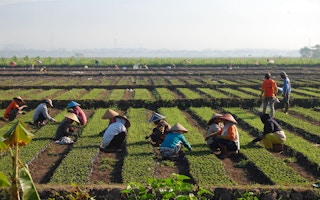Millions of smallholder farmers in South and Southeast Asia are missing out on new, resilient seeds that could improve their yields in the face of climate change, according to an index published on Monday.
The 24 top seed companies fail to reach four-fifths of the region’s 170 million smallholder farmers for reasons such as poor infrastructure, high prices and lack of training, the Access to Seeds Index found.
Access to seeds bred to better withstand changing weather conditions such as higher temperatures is vital as farmers battle loss of productivity due to climate change, said Ido Verhagen, head of the Access to Seeds Foundation, which published the index.
“We see increasing demands for new varieties, because (farmers) are affected by climate change,” Verhagen told the Thomson Reuters Foundation.
“If we want to feed a growing population, if we want to tackle climate change, if we want to go towards a more sustainable food system, we have to start with seeds,” he said.
Smallholder farmers managing between one to 10 hectares of land provide up to 80 per cent of the food supply in Asia, said the United Nations’ Food and Agriculture Organization (FAO).
But traditional methods of preserving seeds from harvests are not always sufficient to cope with a changing climate.
About 340 million people were hungry in 2017 in South and Southeast Asia, a number that has barely changed since 2015, according to latest figures from the United Nations.
“
If we want to feed a growing population, if we want to tackle climate change, if we want to go towards a more sustainable food system, we have to start with seeds.
Ido Verhagen, head, Access to Seeds Foundation
“The question is how to get markets to provide the varieties (of seeds) that farmers want, at prices that they’re able to pay,” said Shawn McGuire, agricultural officer at the FAO.
Some smaller companies are leading the way in helping smallholders access more resilient seeds, Verhagen said, such as Thailand-based East-West Seed which topped the index ahead of global giants Bayer and Syngenta, which ranked second and third.
East-West Seed has built a successful business focusing purely on smallholders, he said, while Indian companies Acsen HyVeg and Namdhari, ranked sixth and seventh respectively, have also reached small-scale farmers with seeds.
The index, funded by the Dutch government and the Bill and Melinda Gates Foundation, ranks companies based on seven areas including strategies to help small farmers and supporting conservation.
This story was published with permission from Thomson Reuters Foundation, the charitable arm of Thomson Reuters, that covers humanitarian news, women’s rights, trafficking, property rights, climate change and resilience. Visit http://news.trust.org)










